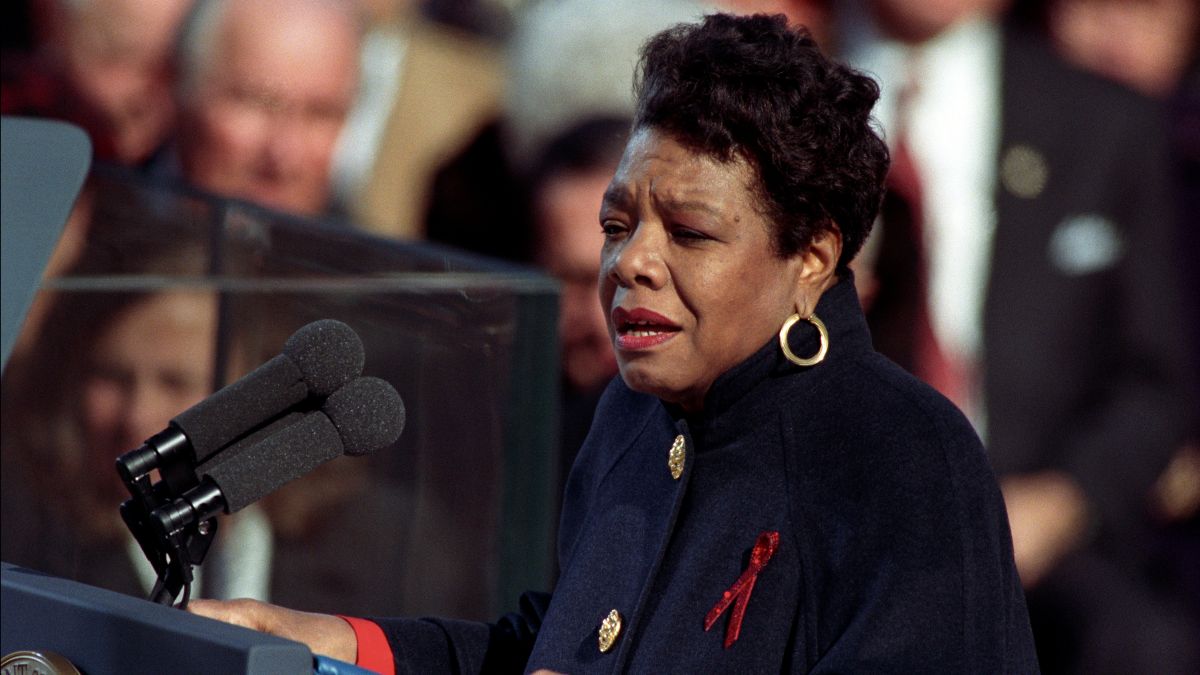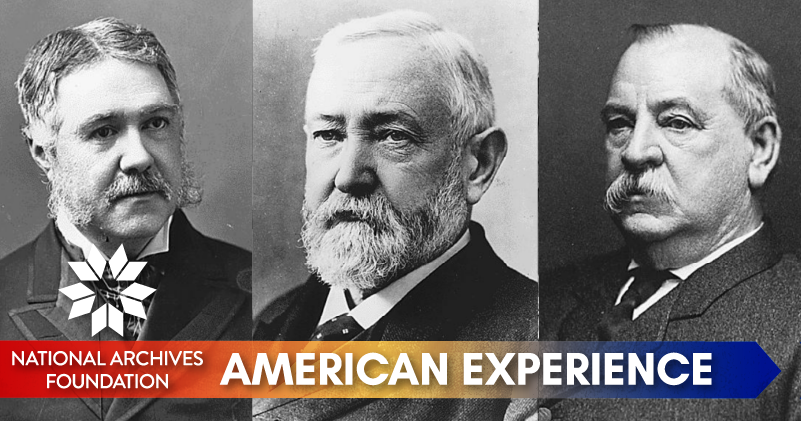Give Peace a Chance
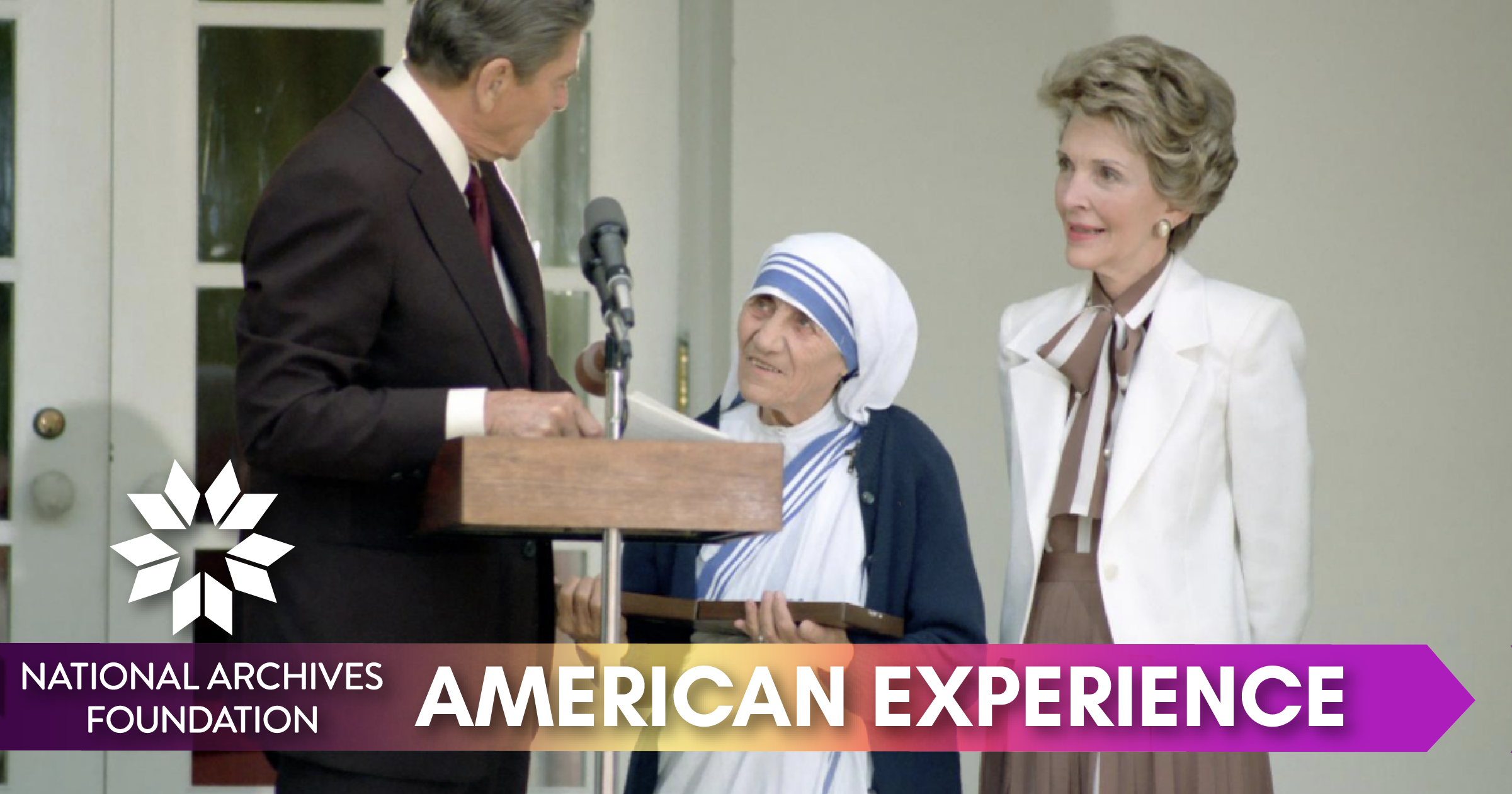
Often, we recall history by conflict. Many schools’ textbooks use wars as historical mile markers. While it is important to honor those who have fought for our country’s ideals, there are many lesser-told stories about the peace activists who lived during these same times.
Many peace activists were women who took the unpopular stance of protesting conflict. The first woman in Congress, Jeanette Rankin, framed it when she said, “As a woman, I cannot go to war, and I refuse to send anyone else.” Following her lead, countless women used their seats of power to promote antiwar ideas – whether it was in the halls of Congress, in community organizations, or in the classroom.
As the Archives records show, peace activism can be messy, controversial, and a difficult fight to win. This week, we’re honoring the women who took up the cause of ending conflict, saving lives, and giving peace a chance.

Patrick Madden
Executive Director
National Archives Foundation
Her Proudest Moment
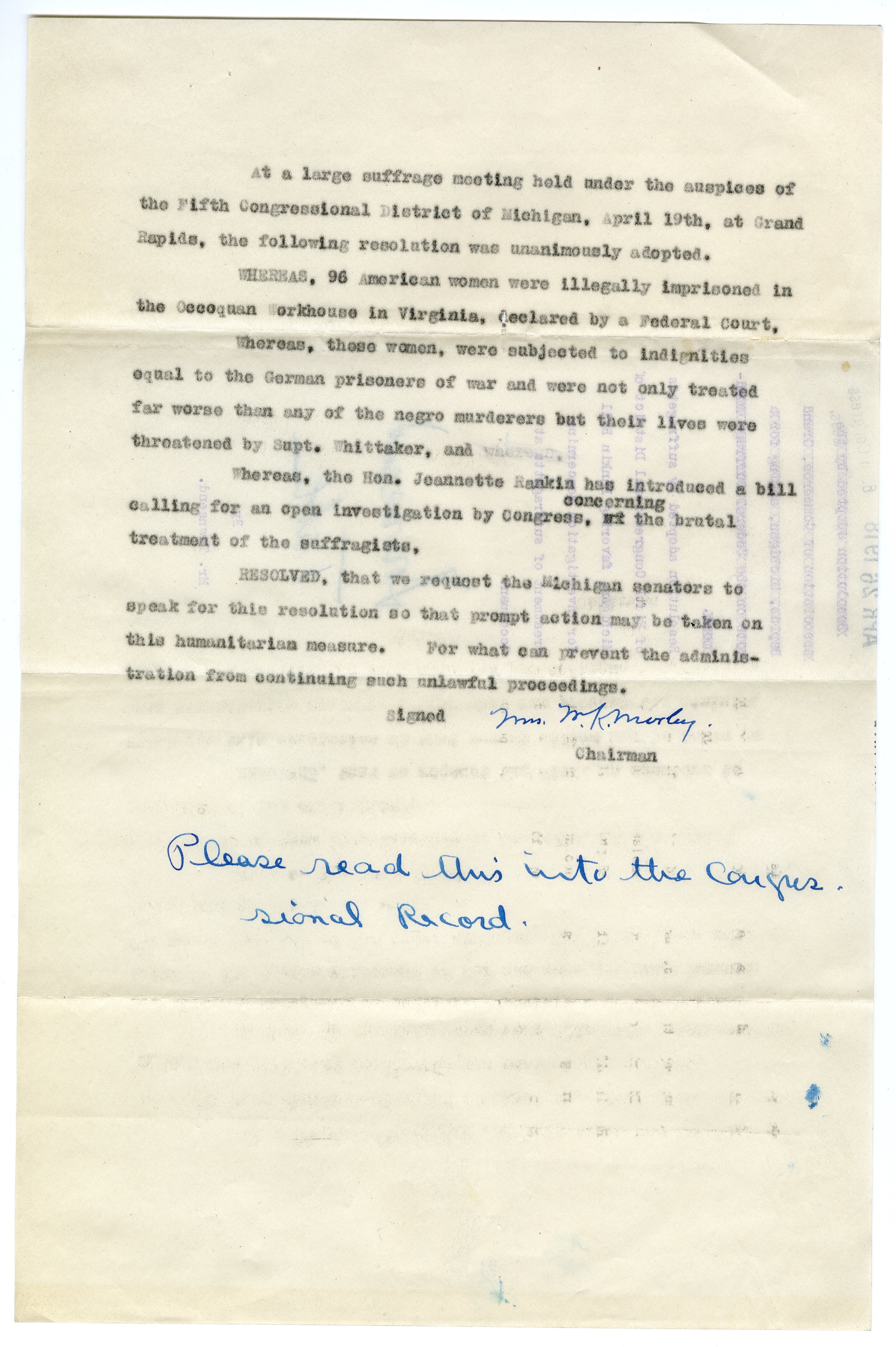
Resolution Adopted by Suffragetts [sic] of Fifth Congressional District of Michigan, Favoring Rankin Bill for Investigation Concerning Treatment of Suffragetts [sic] at Occoquan
National Archives Identifier: 74884416
The first woman elected to Congress took her seat before women had been given the right to vote. Jeannette Rankin was the eldest daughter of John Rankin and Olive Pickering Rankin, a prosperous couple who owned a ranch near Missoula, Montana. She learned early on that during the 1890s, women on the western frontier worked as equals with men, but they were not their political equals.
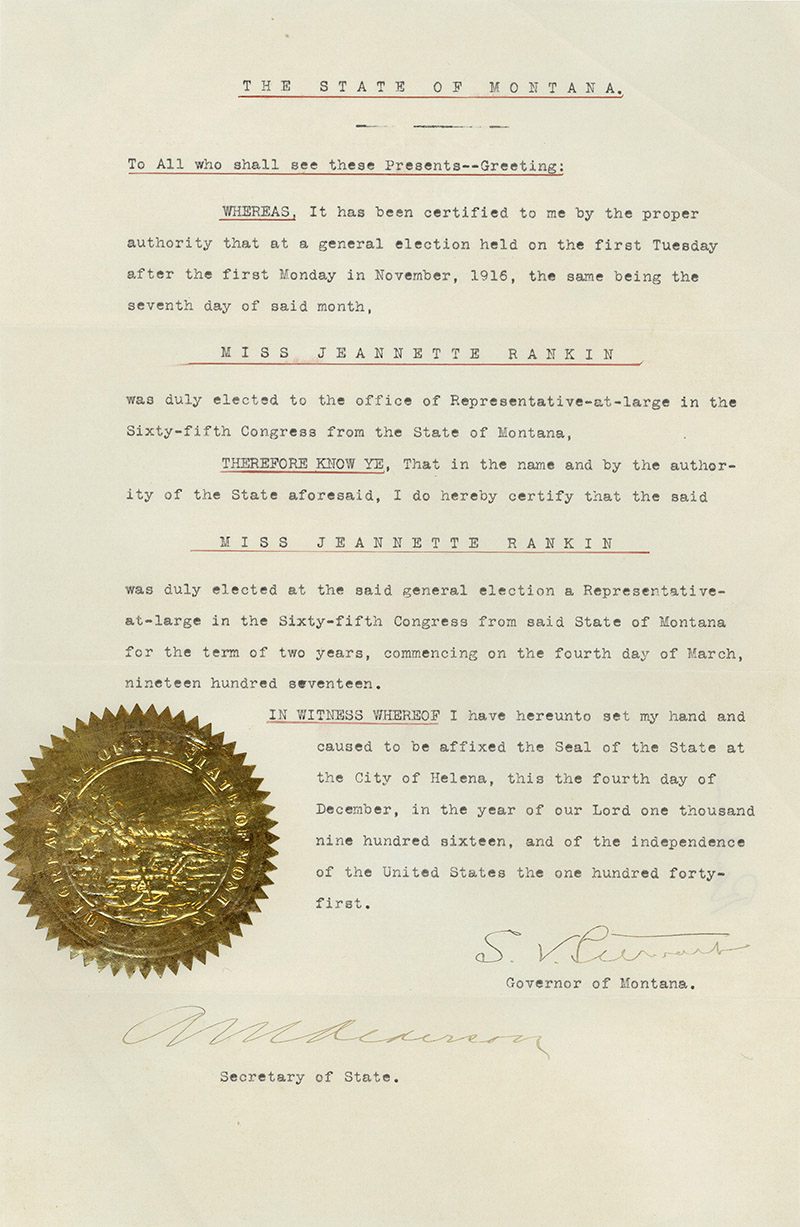
Rankin’s election certificate
Source: National Archives Museum
Rankin graduated with a degree in biology from the University of Montana in 1902 and then worked at the Telegraph Hill settlement house in San Francisco in 1904, where she became interested in social work. In 1909, she graduated from the New York School of Philanthropy (now the Columbia University School of Social Work). She went on to advocate for important issues of the Progressive Era—prohibition, child welfare, and women’s suffrage. She was also a pacifist, a stance that got her into trouble with many people.
Rankin was elected to the House of Representatives in 1916. Her brother Wellington, the youngest of her six siblings, financed and ran her campaign. She had barely gotten her seat warm when on April 2, 1917, President Woodrow Wilson asked Congress to declare war on Germany. Despite popular opinion and the fervent urging of her brother Wellington, Rankin was one of fifty who voted against the declaration. “I wish to stand for my country,” she said, “but I cannot vote for war.” She was roundly criticized for her stance. When her term was up, she ran for a seat in the Senate and was defeated.

First Congresswoman Jeannette Rankin
Source: National Archives Museum
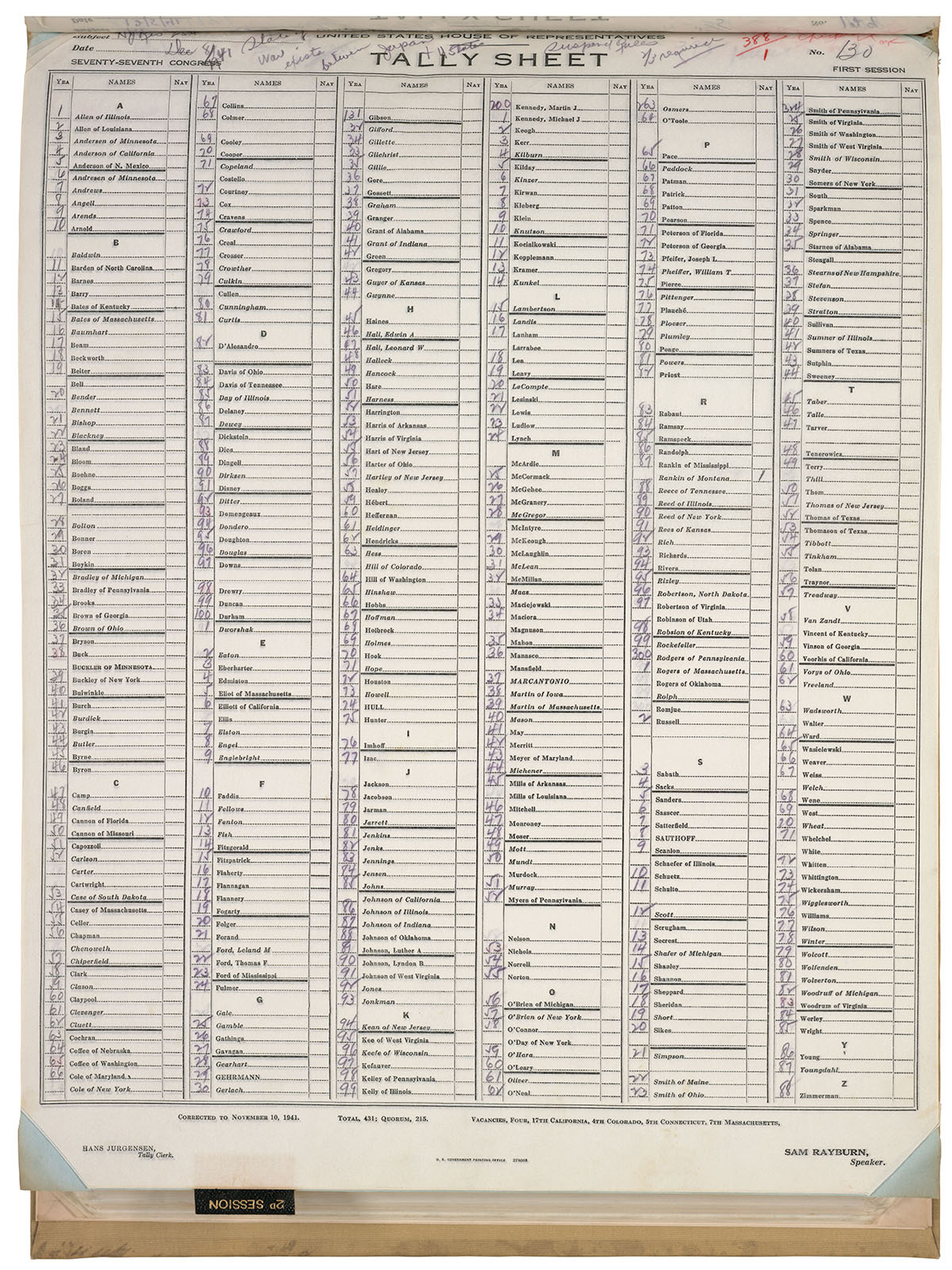
WWII House vote tally war against Japan
Source: National Archives Museum
After leaving Congress, Rankin worked for several pacifist organizations. She bought a farm in Georgia, and she moved back and forth between there and Montana. She continued to advocate for peace even as it became evident that war in Europe was rapidly approaching.
After a hiatus of more than twenty years, Jeanette Rankin ran for the House of Representatives again in 1940 and was again elected to represent the state of Montana. She served one term before retiring from politics for good. She again refused to vote for a declaration of war against Japan in 1941. She was also outspokenly opposed to the war in Vietnam, even leading a protest against the war in 1968. But she remained adamant that her labors for peace were not her proudest moments. “If I am remembered for no other act,” she said, “I want to be remembered as the only woman who ever voted to give women the right to vote.”
Clips collected by CBS for its 1960s television documentary series, WORLD WAR I
(11 minutes 21 seconds, NO SOUND)
National Archives Identifier: 89241
Battling Bella
Her enemies called her “Battling Bella,” and they probably weren’t too happy when she embraced that nickname instead of being embarrassed by it. No matter what cause she was fighting for, Bella Abzug relished the combat.

Letter from 41 members of the U.S. House of Representatives to President Gerald R. Ford concerning the evacuation of American nationals from Vietnam
National Archives Identifier: 186675
Bella Savitzky’s parents were Russian Jewish immigrants who ran a deli in New York City. She worked there as a young girl. From childhood, she found the differences in the way men and women were treated in her Jewish synagogue hard to tolerate.

Letter from the organization Members of Congress for Peace Through Law to President Gerald R. Ford concerning the extent and direction of the continuing U.S. involvement in Indochina
National Archives Identifier: 186688

Memorandum for Henry Kissinger Regarding Anti-Vietnam Activities Scheduled for January 25-27, 1975
National Archives Identifier:7367433
Savitzky graduated with a political science degree from Hunter College and then studied law at Columbia University. In 1944, she met Martin Abzug on a bus on the way to a concert, and they were married that same year. After she passed the bar in 1945, she launched full tilt into defending all kinds of people who were facing all kinds of equity issues—tenant’s rights, labor rights, civil rights. One of her highest profile cases was that of Willie McGee, a black man convicted of raping a white woman in Mississippi. An all-white jury found him guilty in two and a half minutes. Abzug represented McGee in his appeal of the case, but she lost the appeal and McGee was executed in 1951.

Source: NARA’s Unwritten Record blog
Bella Abzug never backed down from defending any cause she believed in. She was an outspoken advocate of the Equal Rights Amendment, the Civil Rights Congress, the American Civil Liberties Union, and the Women Strike for Peace. She opposed the Vietnam War and the military draft, and she was a lion in combat against the House Un-American Activities Committee.

President Gerald R. Ford Signing the Proclamation on Women’s Equality Day 1974
in the Cabinet Room
National Archives Identifier: 12082600
In 1970, Bella Abzug was elected to represent the 19th district of New York in the House of Representatives. In 1972, she was elected to represent the 21st district as well. She was no less a warrior in Congress than she had been as a private citizen, taking up the causes of gay rights, chairing the Subcommittee on Government Information and Individual Rights, and sponsoring the Equality Credit Opportunity Act that made it illegal for institutions that granted credit to discriminate applicants on the basis of race, color, religion, national origin, sex, marital status, or age.
Abzug ran for the Senate in 1976 and lost by a very slim margin to Daniel Patrick Moynihan. She remained active in the causes that were close to her heart, writing books, founding and running several women’s advocacy groups, including the Women’s Caucus at the United Nations, and promoting Zionism, which she described as a “liberation movement.”
Decade of Our Destiny: Women — A New Force for Change
(13 minutes 38 seconds)
Source: NARA’s YouTube channel
A Teacher of the Movement

Read more about
Angela Davis
in NARA’s African American Heritage Resources
Angela Davis has been politically active her entire life. Born in Birmingham, Alabama, in 1944, she attended elementary and middle school there and then went to the progressive Elisabeth Irwin High School in New York City. She then attended Brandeis University and studied in France for a year. She graduated with an honors degree in French in 1965. She studied philosophy at the University of Frankfurt in Germany and received her master’s degree from the University of California—San Diego and a Ph.D. from Humboldt University in Germany.
In 1969, Davis was hired by the University of California—Los Angeles to teach philosophy, but she almost immediately got crosswise with Governor Ronald Reagan, who directed the California Board of Regents to fire her because she was a member of the Communist Party. A court ruled her firing illegal, but the board fired her again a year later for using “inflammatory language.” Governor Reagan declared that Davis would never teach in the University of California system again. Davis’s vocal support for the Black Panther Party was another reason Governor Reagan and the FBI persecuted her.
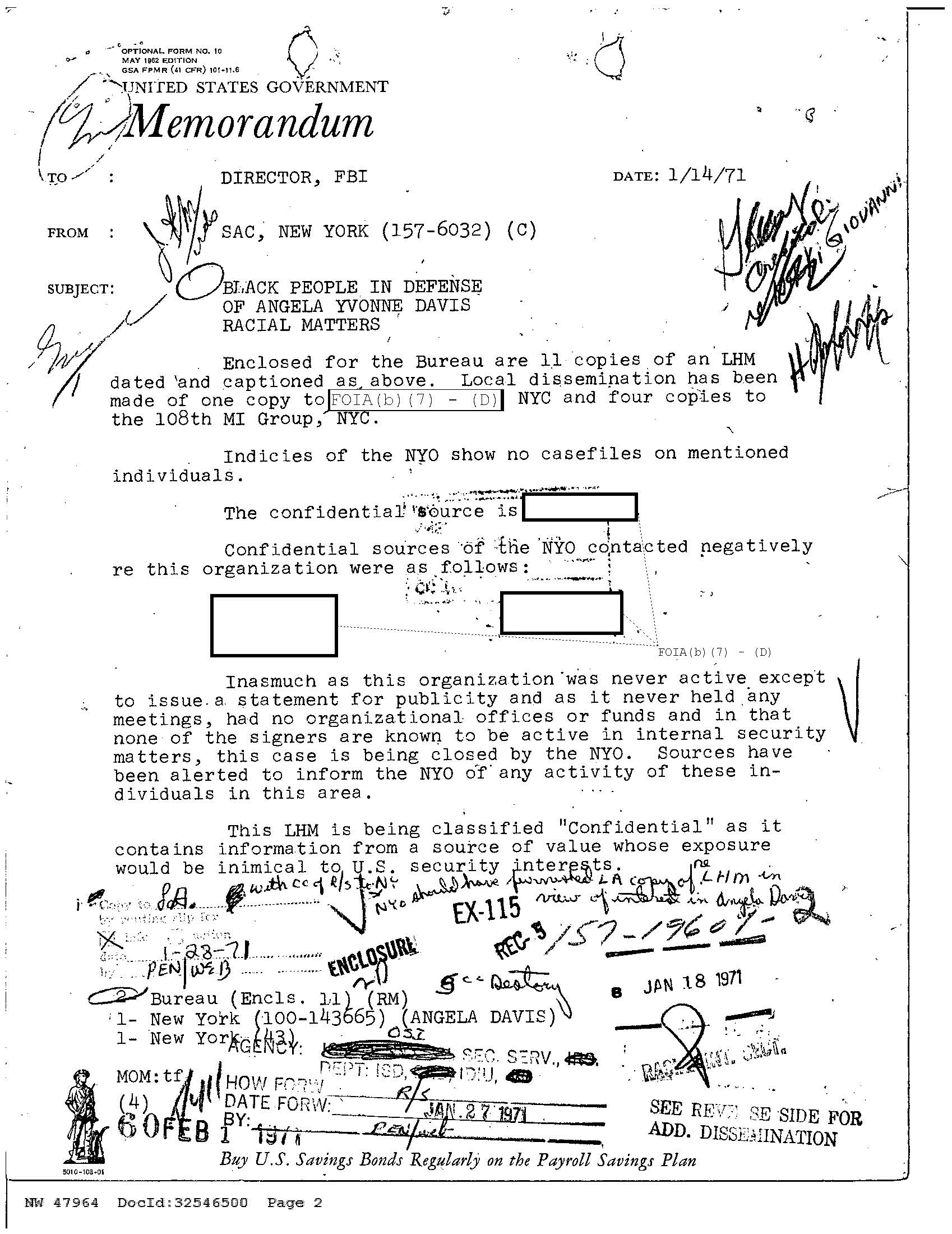
[FBI Headquarters] – 157-19609 v.1 [Classification – Civil Unrest] – Black People in Defense of Angela Yvonne Davis
National Archives Identifier: 6072769
Then in 1970, three prisoners from Soledad Prison were being tried for killing a prison guard. Jonathon Jackson, the younger brother of one of the prisoners, George Jackson, took over the courtroom, held three female jurors, the prosecutor, and the judge hostage, and demanded that his brother and the other two prisoners be set free. In the end, a gunfight with police erupted, and Jonathan Jackson, the defendants, and the judge were killed and the prosecutor and one of the jurors were injured.
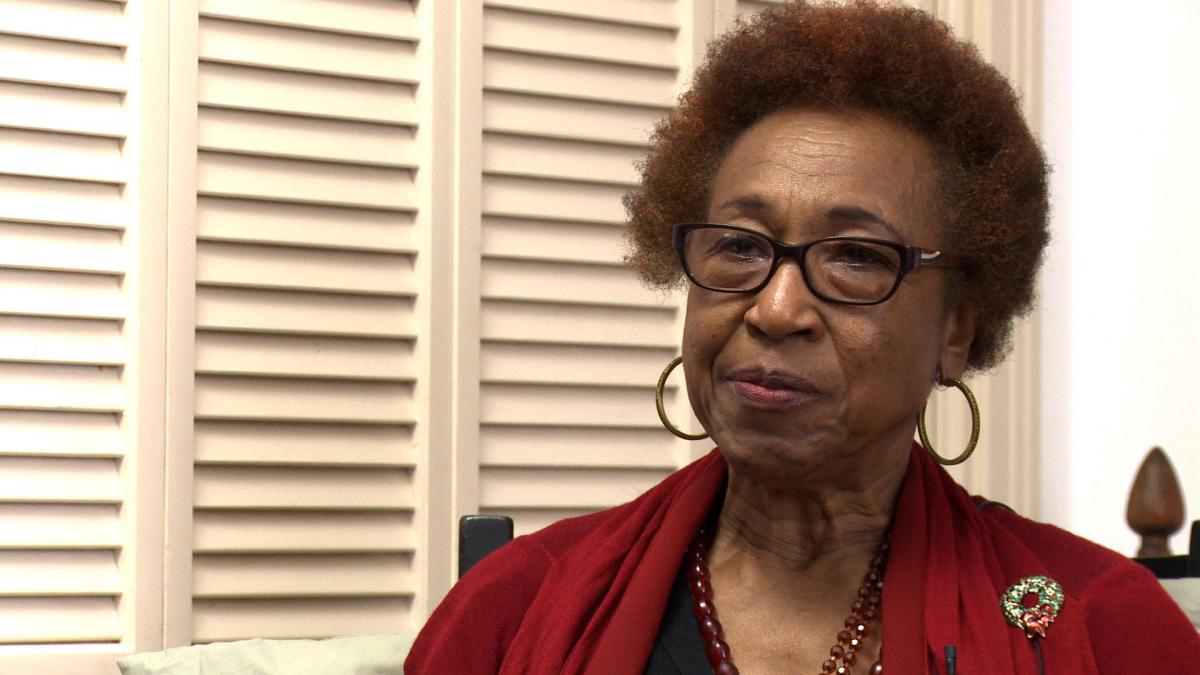
Read more about
Women in Black Power
in NARA’s African American Heritage Resources
Angela Davis was accused of buying the weapons that Jonathon Jackson used to take over the courtroom. She fled to avoid prosecution and was on the run for two months before she was arrested in New York. She was jailed for more than a year, and during her trial and imprisonment, the Black community rallied around her in support. When she was tried, an all-white jury found her not guilty in 1972.
Davis then went on an international speaking tour, during which she visited several communist nations, including Cuba. When she returned, she taught at the Claremont Black Studies Center at the Claremont Colleges in California, at the San Francisco Art Institute, and at San Francisco State University. Despite Ronald Reagan’s promise, Davis was been a professor in the History of Consciousness and the Feminist Studies departments at the University of California, Santa Cruz from 1991 to 2008. She is now a distinguished professor emerita there. She became a regents’ lecturer at UCLA in 2014.
Throughout her life and career, Angela Davis has been an outspoken critic of the prison-industrial complex and an advocate of prisoners’ rights.

The Schoolhouse Gates

in the 20th Century:
Tinker v. Des Moines
an Article & Podcast
in NARA’s Education Updates blog
Mary Beth Tinker and John Tinker were siblings who lived in Des Moines, Iowa, with their family. Their father was a Methodist minister.

John F. Tinker et. al.
v.
The Des Moines Independent Community School District et. al.
National Archives Identifier: 7788707
In December 1965, Senator Robert Kennedy called for a Christmas truce to end the war in Vietnam. On December 16, 1965, Mary Beth and John Tinker wore black armbands to school in protest of the war. The school administration had learned of the planned protest and had warned students that they would be suspended if they wore the armbands to school, but the Tinkers and several other students did it anyway. Among the two dozen or so students who wore black armbands in protest that day, five students, including the Tinkers, were suspended. At thirteen, Mary Beth was the youngest protester to be punished.
The school administrators contended that the black armbands would cause disruptions at school. After the school board voted to affirm the banning of the armbands, the Iowa Civil Liberties Union filed suit on behalf of John Tinker, Mary Beth, student Christopher Eckhardt, and their respective fathers in the U.S. District Court of the Southern District of Iowa. The ICLU claimed that the suspensions had infringed on the students’ right to free expression that is enshrined in the First Amendment to the U.S. Constitution.

John F. Tinker, et al.
v.
The Des Moines Independent Community School District, et al.
National Archives Identifier: 143073269
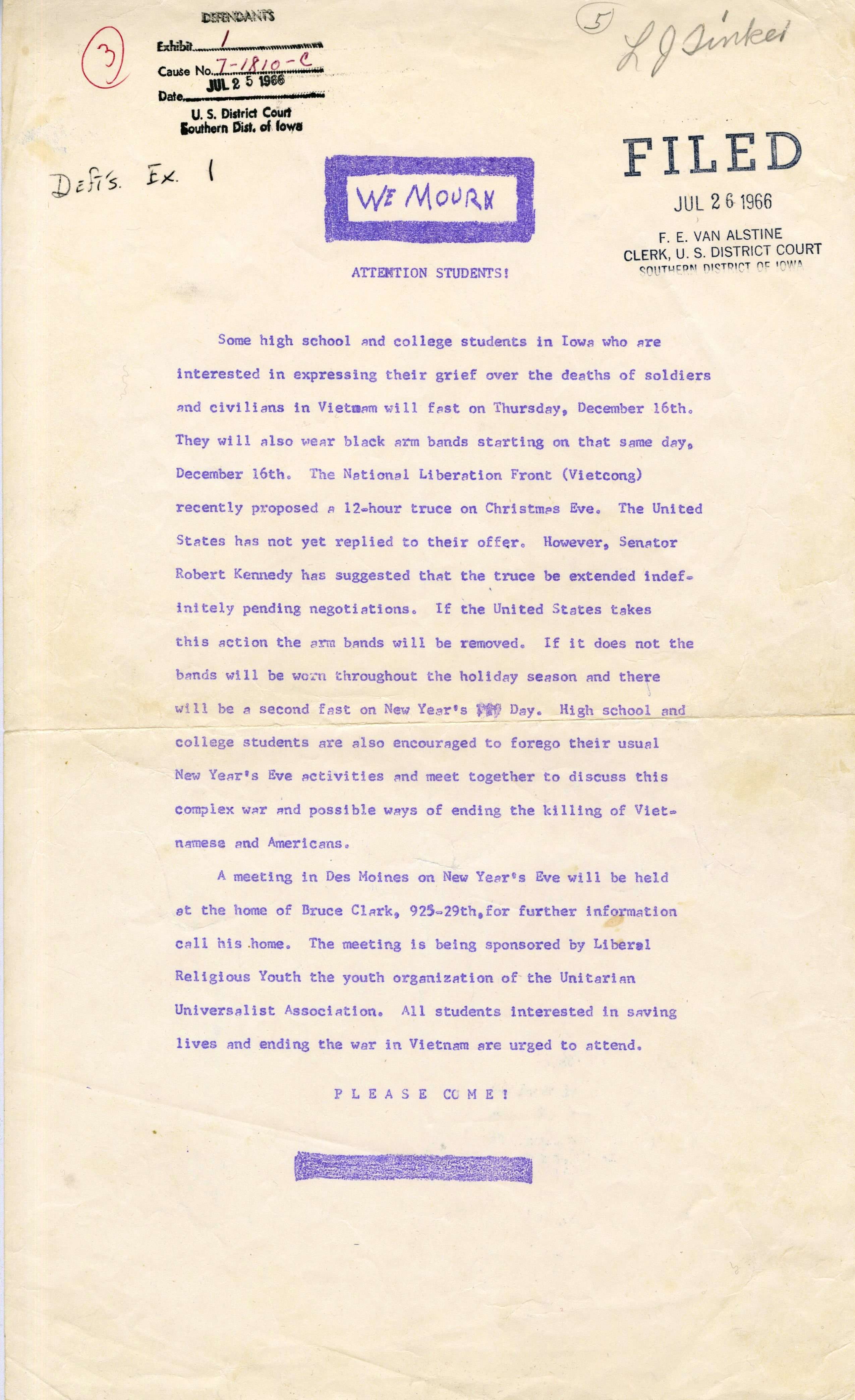
Des Moines Students
December 1965
Source: NARA’s DocsTeach Resources
The district court dismissed the complaint, but the U.S. Court of Appeals for the 8th Circuit issued a split decision. The case moved on to the Supreme Court, which ruled, 7 to 2, on February 24, 1969, that the armbands were “pure speech” and the school’s action was unconstitutional. Supreme Court Justice Fortas wrote, “It can hardly be argued that either students or teachers shed their constitutional rights to freedom of speech or expression at the schoolhouse gate…”
More Than Cookies

Group of Girl Scouts
Planting a Tree
National Archives Identifier: 6820264

Mrs. Myrtle Bisping, a Girl Scout Leader, Helps her Two Girl Scout Daughters Pack “Clothes for Friendship” for Children Abroad
National Archives Identifier: 6423775
They pitch tents, climb mountains, and sell piles of cookies, but Girl Scouts are far more than just these activities. Founded in 1912 by Juliette Gordon Lowe in Savannah, Georgia, the Girl Scouts of the United States of America is an organization devoted exclusively to girls that aims to teach them how to empower themselves. Its members, who are divided into groups by age, earn badges in categories as far ranging as animals, citizenship, coding, financial literacy, leadership, the outdoors, and space science.

First Lady Bess W. Truman Receives Gift from Girl Scouts
National Archives Identifier: 6820708
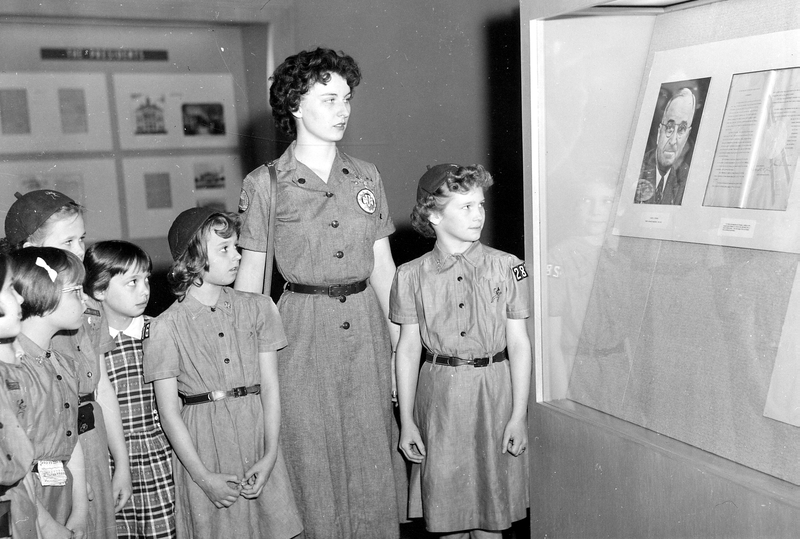
Marti Moore and Girl Scouts on tour of the Harry S. Truman Library
Source: Truman Library
Girls Scouts of America also are devoted to making their members citizens of the world. On February 22 of each year, World Thinking Day observes international friendship, and the Girl Scouts create a program that integrates their values into their observation of this day. Each year has a different theme, but overall, World Thinking Day is a way to reflect on the importance of peace and how best to achieve it. In this photo, a Girl Scout Troop in Clarksburg, WV packs clothing for children abroad; they met their “Clothes for Friendship” donation goal…100,000 bags!

President Barack Obama Signs the Girl Scouts USA Centennial Commemorative Coin Act
National Archives Identifier: 176552436
The Girl Scouts have had a long history of civic engagement, so much so that they have made many trips to D.C. to promote the empowering and civic involvement of girls and young women. Take a look at their achievements and historic visits; if you join a troop, could this be you?
Women’s History Month programming is made possible in part by the National Archives Foundation through the generous support of Denise Gwyn Ferguson.

